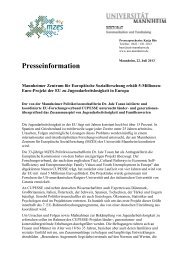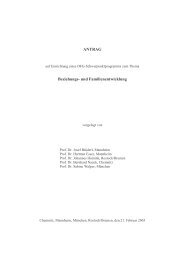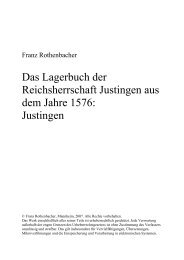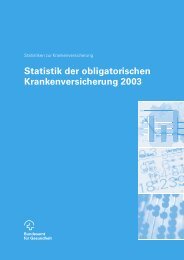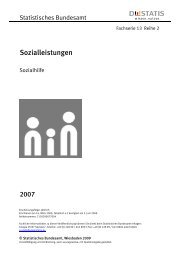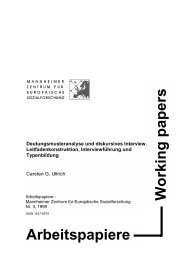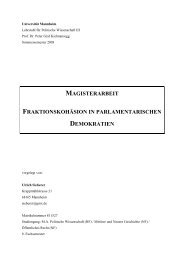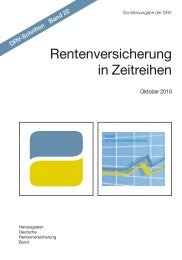Tobias Auberger and Tanja Hitzel-Cassagnes - Mzes
Tobias Auberger and Tanja Hitzel-Cassagnes - Mzes
Tobias Auberger and Tanja Hitzel-Cassagnes - Mzes
You also want an ePaper? Increase the reach of your titles
YUMPU automatically turns print PDFs into web optimized ePapers that Google loves.
19<br />
tional role <strong>and</strong> function but also the practice of concrete adjudication. This, of course, is<br />
rather a substantial question regarding the possibility <strong>and</strong> effectiveness of judicial remedies<br />
<strong>and</strong> the “Rechtswahrungsfunktion” of courts. Although we cannot deal with these substantial<br />
issues in this context we would like to hint at two phenomena that might lead to the<br />
conclusion, that the present system of judicial remedy is rather deficient in term of protecting<br />
individual rights <strong>and</strong> interests: Firstly, there are rather obstinate <strong>and</strong> persistent conflicts<br />
between constitutional <strong>and</strong> lower courts regarding the interpretation <strong>and</strong> enforcement of<br />
European law (whereas, most of the time, the constitutional courts are the pro-European<br />
<strong>and</strong> anti-formalist parties); Secondly, individual as well as public- <strong>and</strong> corporate-interest<br />
plaintiffs try to bypass the national system of judicial review, searching for judicial remedies<br />
at the European level for instance (esp. the CfI, ECJ as well as the ECHR) or searching<br />
for conflict resolution at non-state extra judicial institutions like tribunals, arbitration bodies<br />
etc. (see XX).<br />
4. Conclusion<br />
Resuming the different kinds of difficulties associated with the functioning of an enlarged<br />
Union <strong>and</strong> the processes of (re)Constitutionalisation, only the final point questioning the<br />
legal compatibility of the new member states <strong>and</strong> the European constitutional system might<br />
lead to quite a pessimistic view with regard to the prospects of integration. The other aspects<br />
– be it related to substantial conflicts about the status <strong>and</strong> meaning of the “acquis”, to<br />
plurality <strong>and</strong> cultural differences or to institutional settings <strong>and</strong> participation-modes were<br />
not able to raise serious scepticism about potential structural incompatibles. At closer look,<br />
the situation somewhat revealed either that similar kind of problems have always been constitutive<br />
for the development of the European Community/Union – due to their very nature<br />
of being principled conflicts about the nature <strong>and</strong> the scope of integration, or that the problems<br />
are attributable not genuinely to the new member states but to the European Union as<br />
a polity, questioning its functioning <strong>and</strong> the modes of institutional processes. In this context<br />
we have pleaded for a problem-solving mode that is aiming at open <strong>and</strong> symmetric learning<br />
processes, <strong>and</strong> that is, at the same time, stepping back from the notions of prefigured constitutionalisation<br />
<strong>and</strong> one-sided adaptation. Instead, the inclusion <strong>and</strong> participation of potential<br />
new voices should be taken seriously, <strong>and</strong> as a chance for reflexive re-assurance on the one<br />
h<strong>and</strong> <strong>and</strong> as a change for mutual <strong>and</strong> reciprocal learning-processes on the other.



